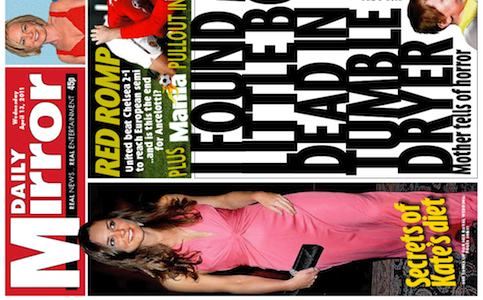It’s always odd when you find yourself out of sync with public opinion. Specifically at the moment it’s the phone-hacking thing… there is a growing strand of opinion that the reaction is overblown and hysterical, that the media is only obsessed with it because it is a story about the media, that we should really be focussing on Very Serious stories like famine in East Africa and the possibility of a European sovereign debt crisis or a US default. And that the worldly, sophisticated reaction is to tut a bit over the bad behaviour of the tabloids but say t’was ever thus.

And there is some truth to it, of course. There is a touch of the feeding frenzy in the way that the story has completely consumed all news and politics for the past week or so. After all, the latest phase of the phone-hacking investigation had been rolling on for months; Andy Coulson resigned back in January. And there were already plenty of reports of large scale criminality at the New of the World, including payments to the police as well as blagging and phone-hacking, none of which seemed to get a lot of political traction.
And then the story of them hacking Milly Dowler’s phone came out and suddenly the world went mad. Yesterday, for example, BBC radio broadcast live, continuous, almost uninterrupted audio from parliamentary select committees for about seven hours straight. And it made a rather wonderful change, to get current events live and unmediated without all the usual commentary, analysis and gossip: but it’s still extraordinary, the way it pushed everything else out of the news altogether.
So I think you can argue that there is something disproportionate about that sudden ramping up in intensity, even if much of it was fuelled by events: arrests, resignations, the closing the of the News of the World. Either the media and politicians are overreacting now, or they have been underreacting for months.
But the reason I talk about feeling out of sync with public opinion is that I never understood why everyone wasn’t already horrified. Even when it was ‘just’ celebrities and politicians; I know people don’t necessarily empathise very strongly with film stars and footballers, but the idea that it’s not a big deal if journalists to casually listen in to their private messages, not as part of some kind of hard-hitting investigative journalism, but on the off-chance that they might hear something which will titillate the public enough to sell a few newspapers… I just don’t know what to say. The idea of it makes my skin crawl. And apart from the fact that it’s creepy and sordid, even if you had no personal sympathy for the victims, what about the fact that they were accused of hacking the voicemails of cabinet ministers. I mean, politicians are even less likely to get public sympathy than footballers, but doesn’t it imply something pretty terrifying about press overreach that they would do something like that?
However. Sometimes you just realise that other people are not outraged by the same things you are. And if they don’t share that emotional response, well, you’re probably not going to argue them into it.
» Tiger Shark! is © Miusam CK and used under a CC Attribution licence.



